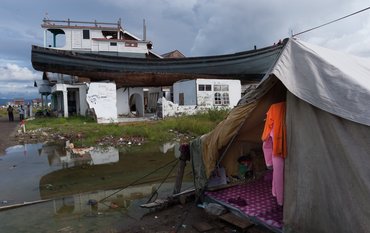The scheduled decommissing of lignite mining in Europe requires innovative, economic and climate-friendly strategies to make the structural change for mining regions sustainable. Furthermore, the efficient storage of renewable energies plays a central role in the future energy system and supply security in Europe. The EU project ATLANTIS links these two aspects and investigates the feasibility of a subsequent use of disused open-pit lignite mines in the form of hybrid energy storage facilities. Coordinated by the GFZ German Research Centre for Geosciences, it brings together six research institutions and energy supply companies from Greece, Poland and Germany. The European Union is funding the project for the next three years with a total budget of around 2.7 million euros through the Research Fund for Coal and Steel (RFCS).
Above-ground pumped-hydro power storage allow flexible and efficient storage of excess energy from solar and wind power generation and the electricity grid. Pumped storage plants usually operate with at least two water reservoirs, which are located at different elevation levels. Pumps driven by the excess energy transport the water into the upper reservoir. There it is stored in the form of potential energy, which can be converted back into electrical energy by releasing the water into the lower basin using turbines.
"The main objective of ATLANTIS is to develop an integrated technical and economic feasibility study for hybrid energy storage of excess energy in former open-pit lignite mines in line with the requirements of the European Green Deal on climate and nature protection," says Thomas Kempka, head of the project and head of the Process Simulation working group in the Fluid System Modelling section at GFZ. It is called hybrid because excess energy from the electricity grid can be stored as well as energy from regional renewable sources. The focus is on two representative European mining regions in Greece and Poland that are undergoing change.
Kempka continues: "The after-use concept envisaged in the ATLANTIS project makes a significant contribution to the European Green Deal by integrating energy storage technologies with power generation and energy transport, while at the same time supporting economic development and labour market stabilisation in the respective region."
Further information can be found on the project website (www.atlantis-project.eu) and via the twitteraccount of the project (https://twitter.com/ATLANTIS_EU).
Scientific contact:
Dr.-Ing. Thomas Kempka
Group Leader Process Simulation
Section 3.4 Fluid Systems Modelling
Helmholtz Centre Potsdam
GFZ German Research Centre for Geosciences
Telegrafenberg
14473 Potsdam
Phone: +49 331 288-1865
Email: thomas.kempka@gfz-potsdam.de
Media contact:
Josef Zens
Head of Public and Media Relations
Helmholtz Centre Potsdam
GFZ German Research Centre for Geosciences
Telegrafenberg
14473 Potsdam
Phone: +49 331 288-1040
Email: josef.zens@gfz-potsdam.de











![[Translate to English:] [Translate to English:] Abror Gafurov von dem Schriftzug "Welcome to Azerbaijan" und den UN und COP Logos](/fileadmin/_processed_/2/5/csm_2024_11_Baku_COP29_Abror_Gafurov_1042faec82.jpeg)


![[Translate to English:] Martin Herold standing in front of the library on the Telegrafenberg](/fileadmin/_processed_/c/d/csm_Martin_Herold_d385ee4dd9.jpeg)
![[Translate to English:] Many people are listening to a presentation in the GFZ lecture hall.](/fileadmin/_processed_/c/a/csm_1_Bild1_hell_b9c0e9f5ed.jpeg)






![[Translate to English:] Both scientists sitting on stools in front of a wall of books in the Telegrafenberg library](/fileadmin/_processed_/6/6/csm_Buiter_Castell_DORA_4_e87cb1ea18.jpeg)
![[Translate to English:] Gruppenbild mit 4 Personen](/fileadmin/_processed_/8/d/csm_20241017_GFZ-Emmerman-Medal-005_web_reinhardtundsommer_21a414fa4a.jpeg)






![[Translate to English:] Ice landscape with five red tents](/fileadmin/_processed_/8/9/csm_Zeltlager_auf_dem_Eis_Urheberin_Jenine_McCutcheon_5ced2d523b.jpeg)

